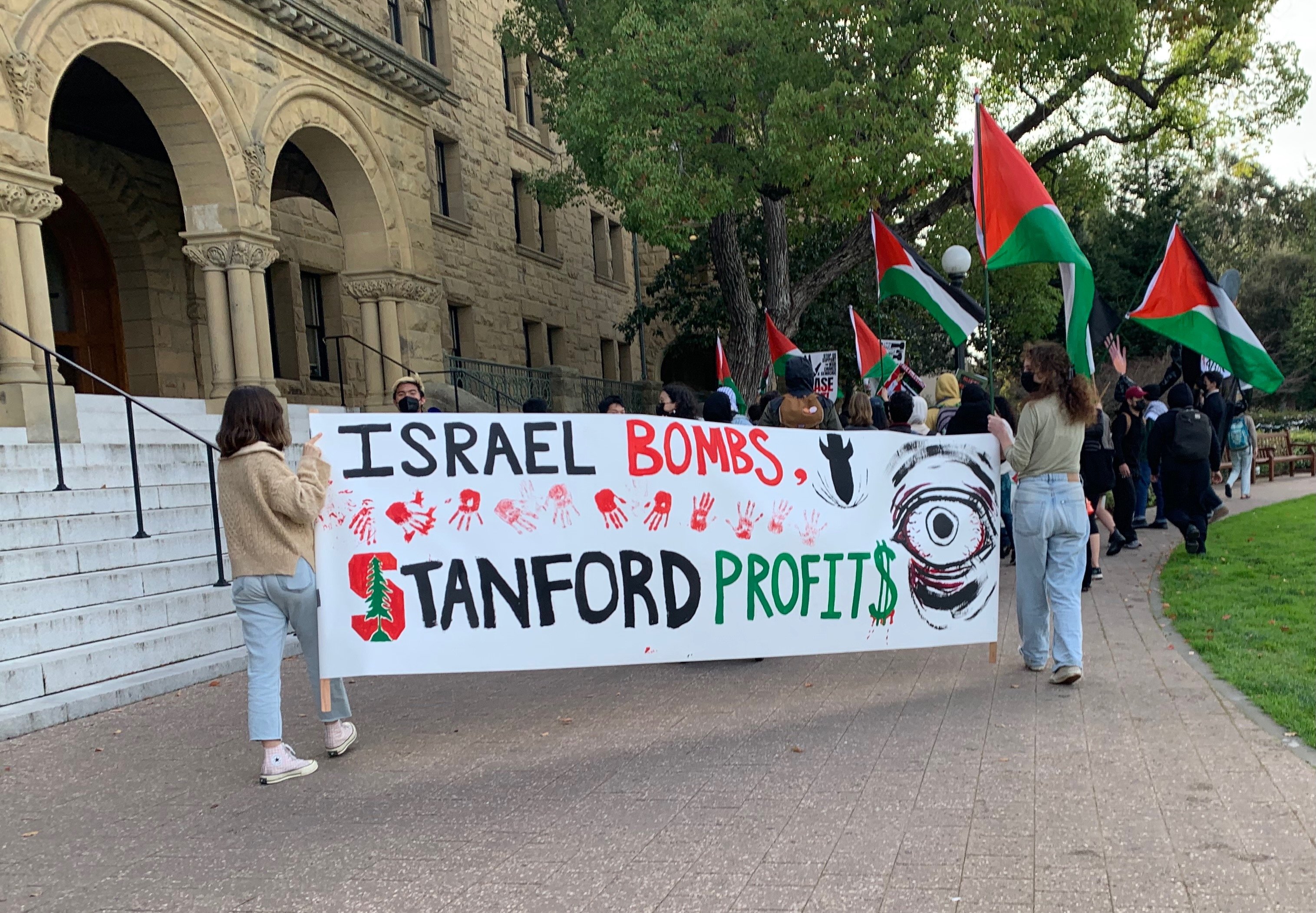Palestinian flags and “Spineless Saller,” a blown-up cut-out of President Richard Saller with bloody hands, waved overhead as 75 students gathered outside Encina Hall at 4 p.m. Tuesday afternoon. Protestors demanded the University divest from Israel, especially ventures tied to the ongoing Israel-Gaza war, and criticized Hoover Institute Director Condoleezza Rice’s involvement in the Iraq War while she was U.S. Secretary of State.
Inside Encina Hall, Rice was speaking at an event titled “What Does America Stand For?” hosted by the Center for International Security and Cooperation at the Freeman Spogli Institute for International Studies.
A speaker for student group Jewish Voices for Peace (JVP), who did not identify themselves, quoted the event’s title and responded, “Apparently genocide.”
Students demanded that Stanford divest from Hewlett-Packard, Lockheed Martin and Chevron. Speakers at the protest included leaders from organizations like Students for Justice in Palestine (SJP), JVP, and the Muslim Student Union (MSU). While associated with these companies through various avenues, it is unclear if the University is directly invested in them because details of the endowment’s portfolio remain private.
Yungsu Kim ’25, a member of the Stanford Asian American Action Committee (SAAAC) who led sections of the rally, said, “To Saller and [Rice], the ball is in your court. We [the students] can only point out the inherent contradictions in the University’s values and actions.”
The Daily has reached out to the University for comment.
As speakers spoke on the actions of Rice and the U.S. government, students repeatedly chanted “Shame!” Speakers also criticized the Biden administration’s proposed $14.5 billion military aid package to Israel.
MSU co-president Mahmoud Hamdi ’24 told demonstrators about his great-grandmother, who fled during the Nakba — an Arabic word meaning “catastrophe” that refers to the mass displacement of Palestinians during the 1948 Arab-Israeli War. Rather than her life’s belongings, he said his great-grandmother chose to save her newborn baby, who grew up to be his grandmother: She understood the “value of human life,” Hamdi said.
Hamdi said colonial actors always use the “name of terrorism” to justify “ethnic cleansing.” According to him, examples of genocide and ethnic cleansing included the Rohingya in Myanmar, Uyghur Muslims in China and Iraqi people during Rice’s term as National Security Adviser and Secretary of State in the Bush administration.
The Israel-Gaza war is “not about religion,” he said. “It’s about settler colonialism and ethnic cleansing.”
The Daily has reached out to Rice for comment.
“Not another nickel, not another dime, no more money for Israel’s crimes,” the crowd chanted repeatedly throughout the rally, at times replacing “Israel” with the names of companies like Boeing and Lockheed Martin.
Lockheed Martin, the largest U.S. defense contractor and the company that supplies the Israeli military with planes and missiles, is a part of Stanford’s Industrial Affiliates Program.
Organizers also said that Chevron, an oil and gas company, profits directly from Israeli occupation because of its gas extraction from gas fields near the Gaza Strip. Chevron is also a member of the University’s Industrial Affiliates Program.
The Industrial Affiliates program is meant to facilitate mutually beneficial exchange between Stanford researchers and corporations where “faculty and students can learn about industry perspectives and priorities, and corporate members are exposed to new ideas and research directions,” according to the program’s website.
At around 4:45 p.m., Kim announced to protestors that administrators inside Encina Hall had told protestors to turn off amplified sound or face Office of Community Standards (OCS) disciplinary action. The organizers complied by turning off their microphones and speakers but asked the crowd to chant and drum louder.
The protestors circled the building for the next hour until Rice’s event ended, chanting slogans including, “Free, free Palestine.” Security prevented protesters from entering the Encina Courtyard.
This article has been updated to reflect that Stanford’s investments are not publicly disclosed and it is unclear if the University is invested in Hewlett-Packard, Lockheed Martin and Chevron.
